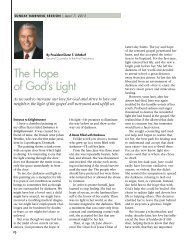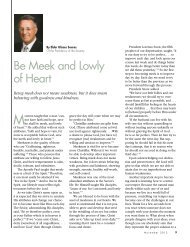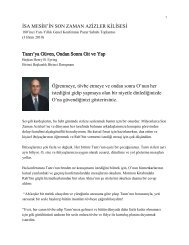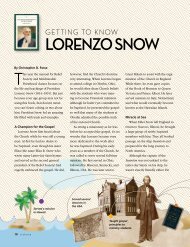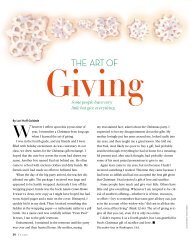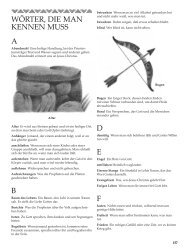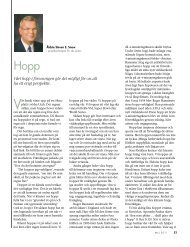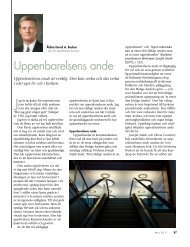April 2005 Ensign - The Church of Jesus Christ of Latter-day Saints
April 2005 Ensign - The Church of Jesus Christ of Latter-day Saints
April 2005 Ensign - The Church of Jesus Christ of Latter-day Saints
You also want an ePaper? Increase the reach of your titles
YUMPU automatically turns print PDFs into web optimized ePapers that Google loves.
16<br />
Examples <strong>of</strong> Patience<br />
Desiring to review how others responded in similar situations,<br />
I turned to the scriptures. I found my first example<br />
in the Book <strong>of</strong> Mormon. Moroni had been appointed chief<br />
captain <strong>of</strong> the Nephite defense, and his army had suffered<br />
great losses in battling the Lamanites. To continue withstanding<br />
the Lamanites, the Nephite army needed more<br />
warriors, more weapons, and more provisions. Moroni<br />
wrote a letter requesting assistance from Pahoran, the chief<br />
judge and governor over the land. But he received no reply.<br />
So Moroni, in a state <strong>of</strong> aggravation and frustration because<br />
<strong>of</strong> his army’s severe hunger and casualties, wrote<br />
another letter to Pahoran “by the way <strong>of</strong> condemnation”<br />
(Alma 60:2). Using words such as “neglect” (v. 6), “thoughtless<br />
stupor” (v. 7), “slothfulness” (v. 14), “traitors” (v. 18),<br />
and “idleness” (v. 22), Moroni questioned<br />
whether Pahoran was a traitor,<br />
and he threatened to abandon the<br />
war against the Lamanites and “stir<br />
up insurrections among you” (v. 27).<br />
If ever one had cause to feel defensive<br />
for being falsely accused, it was<br />
Pahoran. But Pahoran’s reply was a<br />
masterpiece <strong>of</strong> self-restraint and patience.<br />
Rather than returning complaint<br />
for complaint, he calmly and<br />
kindly explained how insurrection and<br />
rebellion against the government had<br />
made it impossible to send help. <strong>The</strong>n<br />
he stated, “And now, in your epistle<br />
you have censured me, but it mattereth not; I am not angry,<br />
but do rejoice in the greatness <strong>of</strong> your heart” (Alma 61:9).<br />
At the letter’s conclusion, he wrote, “And now I close mine<br />
epistle to my beloved brother, Moroni” (Alma 61:21). Surely<br />
Pahoran’s patient response was pleasing to Heavenly Father.<br />
In modern times, the Prophet Joseph Smith patiently<br />
suffered many trials and afflictions due to unsubstantiated<br />
and wrongful charges against him. After being incarcerated<br />
in Liberty Jail for months and having had his appeals and<br />
petitions denied, he was overwhelmed at one point with<br />
feelings <strong>of</strong> discouragement and anger. But he was comforted<br />
by the Lord’s counsel:<br />
When the Prophet Joseph Smith was wrongfully<br />
accused, he found comfort in the Lord’s<br />
counsel that “all these things shall give thee<br />
experience, and shall be for thy good.”<br />
“If thou art accused with all manner <strong>of</strong> false accusations; . . .<br />
“And if thou shouldst be cast into the pit, or into the<br />
hands <strong>of</strong> murderers, and the sentence <strong>of</strong> death passed<br />
upon thee; if thou be cast into the deep; if the billowing<br />
surge conspire against thee; if fierce winds become thine<br />
enemy; if the heavens gather blackness, and all the elements<br />
combine to hedge up the way; and above all, if the<br />
very jaws <strong>of</strong> hell shall gape open the mouth wide after<br />
thee, know thou, my son, that all these things shall give<br />
thee experience, and shall be for thy good.<br />
“<strong>The</strong> Son <strong>of</strong> Man hath descended below them all. Art<br />
thou greater than he?” (D&C 122:6–8).<br />
<strong>The</strong> supreme example <strong>of</strong> patience, <strong>of</strong> course, was the<br />
Savior Himself, who humbly bore unthinkable suffering<br />
at the hands <strong>of</strong> false accusers. He suffered<br />
as they beat Him, spat upon<br />
Him, mocked Him as the King <strong>of</strong> the<br />
Jews, and delivered Him up to be crucified<br />
for crimes He did not commit.<br />
Isaiah wrote, “He is despised and rejected<br />
<strong>of</strong> men; a man <strong>of</strong> sorrows, and<br />
acquainted with grief: and we hid as it<br />
were our faces from him; he was despised,<br />
and we esteemed him not”<br />
(Isaiah 53:3). Isaiah continued, “He was<br />
oppressed, and he was afflicted, yet he<br />
opened not his mouth: he is brought<br />
as a lamb to the slaughter, and as a<br />
sheep before her shearers is dumb, so<br />
he openeth not his mouth” (Isaiah 53:7).<br />
With divine dignity and self-assurance, the Savior endured<br />
it all patiently. In comparison, my own trial <strong>of</strong> unfair<br />
abuse seemed small and inconsequential. I wondered, how<br />
could I better emulate the Savior and His worthy servants?<br />
Changing through <strong>Christ</strong><br />
I began to pray that I might develop the qualities <strong>of</strong><br />
patience and long-suffering those great men had in such<br />
abundance. But it seemed that the more I prayed for patience,<br />
the more impatient I became; the more I yearned<br />
to be calm and long-suffering, the more troubled I felt. I<br />
ILLUSTRATED BY ROBERT T. BARRETT



